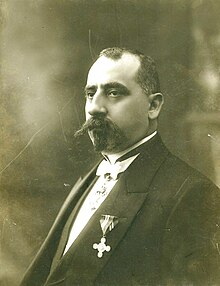Andrey Lyapchev
| Andrey Tasev Lyapchev Андрей Тасев Ляпчев |
|
|---|---|
 |
|
| 22nd Prime Minister of Bulgaria | |
|
In office 4 January 1926 – 29 June 1931 |
|
| Monarch | Boris III |
| Preceded by | Aleksandar Tsankov |
| Succeeded by | Aleksandar Malinov |
| Personal details | |
| Born |
30 November 1866 Resne, Ottoman Empire (now Republic of Macedonia) |
| Died | 6 November 1933 (aged 66) Sofia, Bulgaria |
| Political party | Democratic Alliance |
Andrey Tasev Lyapchev (Tarpov) (Bulgarian: Андрей Тасев Ляпчев (Tърпов)) (30 November 1866 – 6 November 1933) was a Bulgarian Prime Minister in three consecutive governments.
Lyapchev was born in the Macedonian city of Resen, which was at the time a part of the Ottoman Empire, and played a leading role in Bulgarian politics. Lyapchev's family is thought to have originated from a certain Dore, a Megleno-Romanian potter who fled the Islamization of his native Notia and settled in Resen in the 18th century.
Andrey Lyapchev started his education in Resen but after the April Uprising of 1876 the local school was shut down by Ottoman authorities, following the fate of many other Bulgarian schools in Macedonia. He spent the next three years helping his brother Georgi run his shop in Bitola. Georgi was left to take care of the family after the death of their father. In 1879 Lyapchev signed in the Bitola gymnasium and two years later he moved to the newly established Bulgarian Men's High School of Thessaloniki. One of his teacher’s there was his fellow-townsman Trayko Kitanchev, who had a significant influence on the young student. After Kitanchev’s dismissal in 1884 Lyapchev left the school and moves to Plovdiv together with his teacher. At the time Plovdiv was the main city of the Autonomous Province of Eastern Rumelia.
Together with other Macedonian students of the Plovdiv gymnasium, like Pere Toshev and Nikola Genadiev, Lyapchev got closer with Zahari Stoyanov and the Bulgarian Secret Central Revolutionary Committee which was preparing the future unification between Eastern Rumelia and the Principality of Bulgaria. He was sent to the Panagyurishte committee on 2 September 1885, but authorities arrested him on the way. He was let free only after the Unification had been proclaimed on 6 September. With the beginning of the Serbo-Bulgarian War on 2 September 1885, the whole group signed in the First Volunteers Corps. However, by order of Knyaz Aleksander I students were left at the rear of the advancing army. Nevertheless, Lyapchev and the rest managed to reach the captured town of Pirot. There they were eventually de-mobilised in December, returning to Plovdiv afterwards.
...
Wikipedia
